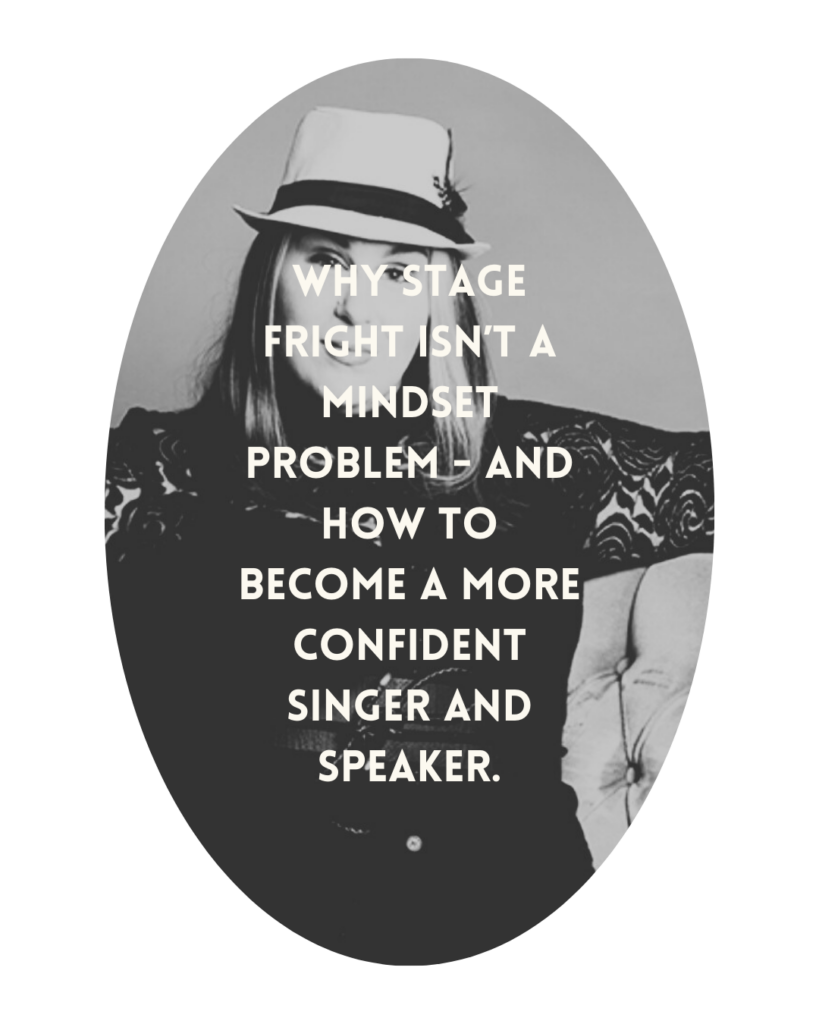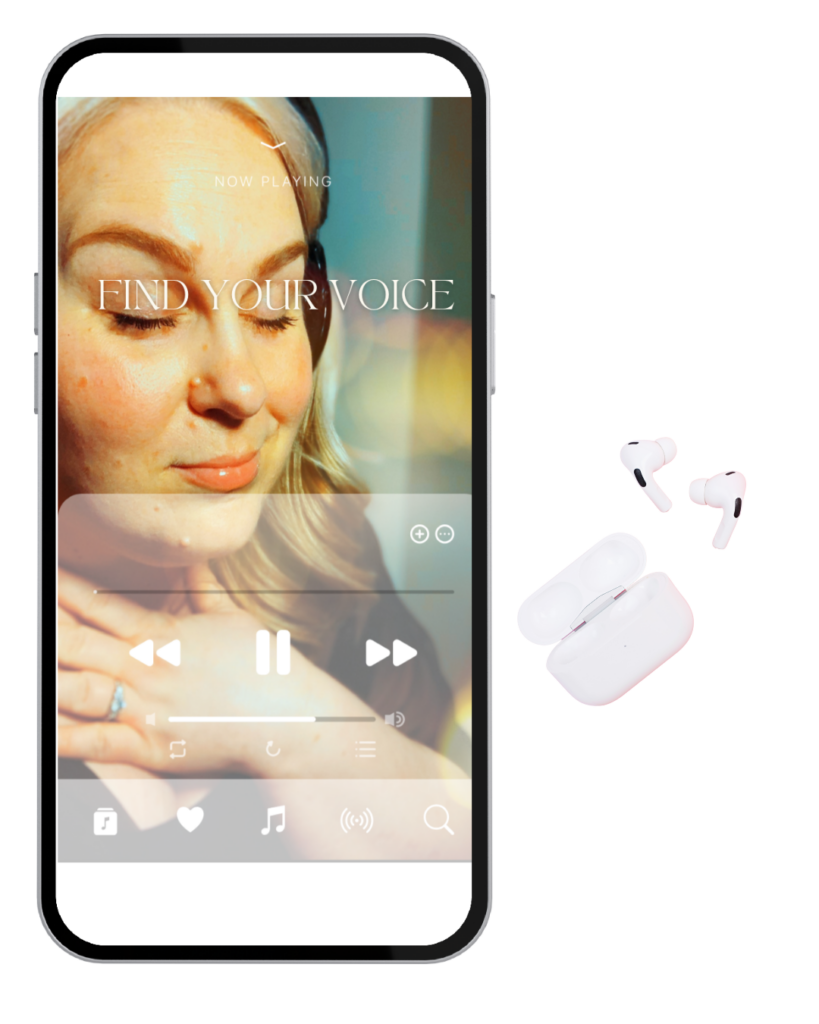© - Content and images in this blog are copyright Elise Besler of EB Voice Empowerment, unless stated otherwise. Feel free to repost or share images for non-commercial purpose, but please make sure to link back to this website and its original post.
℗ - We do not store any information about your visit to our website other than for analytics and optimization for content and reading experience through the use of cookies.
℅ - Our site does at times contain paid advertisements, sponsored content, and/or affiliate links.
Reader Etiquette
I'm your go-to expert for helping to ditch the fear and own your voice. Whether you’re speaking, singing, or setting boundaries, I help you go beyond technique -rewiring your nervous system so full expression feels natural, effortless, and so you.
Hi! I'm Elise Besler - Voice Coach & Somatic practitioner
March 29, 2025

Your brain isn’t broken. Your body isn’t betraying you. Here’s what’s really happening when stage fright kicks in – and how to build true, lasting confidence from the inside out.
“Just think positive.”
“Push through the fear.”
“Fake it ’til you make it.”
If you’ve ever dealt with stage fright – as a speaker, a singer, or simply a human being who wants to be seen and heard – you’ve probably heard this advice. And maybe, like many of us, you tried to will your way through it.
But here’s the thing:
Stage fright isn’t a mindset problem.
It’s a nervous system response.
No amount of positive thinking will override what your body perceives as a threat.
Let’s explore what’s really going on under the surface – and how to become a more confident performer, not by pushing through, but by tuning in.
 What Is Stage Fright, Really?
What Is Stage Fright, Really?
Stage fright is your body’s intelligent, protective response to being seen, exposed, and evaluated.
This shows up as:
- Racing heart
- Shaky voice
- Dry mouth
- Blank mind
- Tight throat
- The sudden desire to vanish completely
Whether you’re standing in front of a crowd or preparing to hit “publish” on your latest reel, your nervous system can interpret visibility as danger.
And that’s not because you’re weak – it’s because your body is doing its job.
 Your Nervous System Isn’t Sabotaging You. It’s Protecting You.
Your Nervous System Isn’t Sabotaging You. It’s Protecting You.
Let’s break it down:
The nervous system is the part of you that tracks safety and threat – automatically.
It doesn’t care if you’re in front of 500 people or five. If something in your history associates performance, exposure, or rejection with danger… your body will remember.
It doesn’t mean something’s wrong with you.
It means your system is doing what it was designed to do – protect you from perceived harm.
But the good news?
You can retrain your nervous system to experience being seen and heard as safe .
That’s where somatic tools and nervous system regulation practices come in.
 For Singers & Speakers: Why Mindset Isn’t Enough
For Singers & Speakers: Why Mindset Isn’t Enough
Let’s be clear – mindset has its place.
But if your vocal cords are tensing, your breath is shallow, and your body is in freeze, no affirmation is going to land.
Before you try to change your thoughts, you need to work with your physiology.
Confidence lives in the body.
It’s not something you perform – it’s something you practice, daily, in relationship with your nervous system.
 5 Body-Based Tools to Build Real Confidence
5 Body-Based Tools to Build Real Confidence
These somatic strategies are especially powerful for singers and speakers looking to calm nerves and regulate before stepping into the spotlight.
1. Ground Your Body First, Not Just Your Thoughts
Confidence starts from the ground up.
Try heel drops, barefoot walking, or even rolling a tennis ball under your feet before a performance.

2. Practice 360° Breathing
Instead of shallow chest breathing, practice expanding your breath into your ribs, back, and belly.

3. Tone the Vagus Nerve (aka your calm switch)
Try humming, sighing, or soft “voo” sounds.
Pair this with gentle movement like head turns or slow neck rolls.

4. Train Your Voice When You’re Not Nervous
Sing in the shower. Speak your presentation aloud while cooking. Read out loud in a calm space.

5. Create a Pre-Performance Ritual
Instead of hyping yourself up, try regulating down:
- Soften your gaze
- Use nervous system regulating exercises
- Orient to the space
- Use gentle tapping or touch to remind your body you are safe

 Final Thoughts: Real Confidence Isn’t Performed — It’s Felt
Final Thoughts: Real Confidence Isn’t Performed — It’s Felt
You don’t need to force your voice to be confident.
You don’t need to fake bravery you don’t feel.
You need to feel safe in your body.
And from that place, your voice will rise – steady, clear, and unshakable.
 Want More Tools to Regulate and Rise?
Want More Tools to Regulate and Rise?
— If you’ve ever struggled to speak up, felt your voice shake in high-stakes moments, or questioned if your words truly mattered, this practice is for you! —
Click HERE for immediate access to the FREE “Find Your Voice” Guided Audio Training.
Take 11 minutes to activate the power of your voice with this guided practice. Includes: Grounding, breath-work and voice-work exercises to help you regulate your nervous system and build a confident voice.

Leave a Reply Cancel reply
Grab
THE "Find YOUR VOICE" AUDIO TRAINING
Welcome, Friend! Around here, we believe that embodiment is sacred, and that every voice deserves to take up space.
This is a space rooted in anti-racism, body liberation, queer-affirming practices, and a commitment to trauma-aware, nervous system-informed growth.